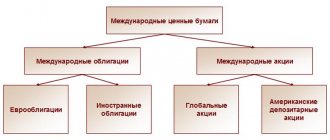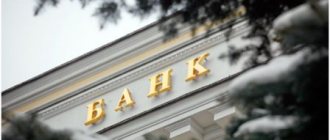Foreign investment means the investment of finance in various types by foreign investors (state, large businesses, foreign financial institutions, funds, individuals) in the economy of another state.
The main essence of international investment lies in the methods and forms of movement of foreign capital. Cash flows are sent to those countries where their use allows for maximum return and profitability.
It must be said that the influx of foreign investment in Russia is hampered by instability in politics, “gaps” in legislation, increased tax rates, and insufficiently developed infrastructure in the production and social sphere (which is incomprehensible and unusual for many businessmen).
International investments: concept and classification
International investments, like investments in general, are investments of funds with the expectation that they will be returned in full, and also that they guarantee additional profits in the future.
But when we talk about international investments, it is important to understand that such conditions have their own characteristics of the movement of funds between states. Some countries have historically had a lower level of development, while others have been leaders in the international market for a long time and are able to dictate their terms to the global economy. There are alliances, friendly countries and adversaries.
Taking this into account, we can say that the main difference between international investments and ordinary ones is the expectation that these investments will change due to the participation of several states in economic processes.
What advantages do international investments give entrepreneurs?
- A state-guaranteed opportunity to organize an enterprise that will work with foreign capital.
- The opportunity to enjoy benefits when making transactions with foreign capital, which is a significant savings.
- Almost complete lack of control over the organization’s financial resources by the state.
- There is no need to distinguish between funds received in the course of external and internal financial transactions.
- The ability to avoid most taxes or use the lowest rates.
- There is no obligation to return international investments in the shortest possible time, so there is time to develop the enterprise.
International investment can come from various sources. In the specialized literature this is called classification according to the form of international investment:
- Private international investments are funds received from private individuals, residents of foreign countries.
- State international investments are funds received by decision of the authorities of foreign states.
- Mixed international investments are funds received both from individuals, residents of foreign states, and by decision of authorities of foreign states.
International investments can take different forms of assets:
- Real international investments are financial resources that are invested by foreign investors in equipment for a long period of time.
- Intangible international investments - assets, rights, patents, licenses, etc.
- Financial international investments - securities, shares, etc.
International investments may differ in the nature of capital placement objects:
- International direct investment is the most common option. Its essence lies in the fact that the investor himself invests funds and constantly monitors how things are going with the enterprise that received money from him.
- International portfolio investment is the acquisition of shares in order to receive dividends due from them.
- Other international investments - a fairly broad list that includes all options that do not fall into the two categories above. A particular example would be a loan received from a foreign state.
International investments may differ in the way they are used:
- Lending international investment is a loan of funds carried out by an investor in order to earn interest.
- Entrepreneurial international investment is the transfer by an investor of financial resources with the goal of eventually receiving dividends from profits.
Read the article: Choosing a niche for business
New methods of exchanging goods
Growth of the world economy since 3000 BC demonstrates how new methods of exchanging goods were developed. Although we once relied on the barter system, civilization has evolved the use of paper money and credit cards to stimulate economic growth. Today's Economic Leaders and Laggards in the World
International direct and portfolio investments
Foreign direct investment (FDI) is the investment of funds in something with the expectation that these resources will be returned and increased in the long term after some activity. At the same time, it is possible to exercise control over capital.
Thus, direct international investment can mean a variety of options, for example, transactions with an investor or any type of property acquired abroad, in particular, international organizations are investments, but in a non-financial form.
What does foreign direct investment include? Companies and organizations that are open abroad. Various subsidiaries and branches. Acquisition of other companies or their securities.
Accordingly, any person - private, legal, state or individual, or several persons at once, can be called a direct investor, provided that they jointly own shares of a foreign organization.
It is noteworthy that today the shares are divided in such proportions that there are situations when a person who acquired about 5% of the shares becomes the holder of a controlling stake. Why is this happening? It's simple: other people may own 0.1% or less of the shares, which makes their votes insignificant and dependent. And, for example, in the USA, direct international investment can be considered the presence of 10% of the authorized capital of an organization. A smaller volume is usually classified as portfolio investment.
International portfolio investments (portfolio investments) are the acquisition of securities of a foreign company to the extent that the investor does not receive the right to control the organization itself. This makes it possible to make a profit, although without participating in the management of the enterprise.
It should be noted that international organizations have limited rates for enterprises with foreign capital to 10%. Why do they need this? In this way they ensure the equivalence of direct and portfolio international investments.
In fact, there are many approaches that can stimulate international direct investment. There are many examples. Someone sets high tariff rates. Others are inventing more sophisticated approaches. In particular, Japan has introduced a limit on the number of cars that are allowed to be exported from the state. Because of this, many companies from the Land of the Rising Sun had to start production in Europe and America.
It is important to consider that international direct investment is closely related to the very concept of international trade. The size of tariff rates has a direct impact on attracting international investment, because a low tariff often plays a larger role in the choice than, for example, the availability of customs benefits. Proper use of this advantage provides a number of countries with deep integration with the international market, as evidenced by recent studies in the field of international economics.
International investments provide significant benefits to the investor's country. This is not obvious at first glance, but a little analysis allows us to better understand this mechanism. By directing international direct investment, the investor enables the investing country to improve its economic situation. This develops the purchasing power of a given state, and therefore it increases the demand for goods produced by the investor’s country. That is, when making international investments in any country, an investor can be sure that this money will subsequently benefit his own state. Of course, this process is built for a reason, but, for example, in the presence of common production chains.
Read the article: Product market analysis
Extreme poverty - an indicator for measuring quality of life
Finally, extreme poverty is often used as an indicator to measure quality of life in countries around the world. While we often focus on the wealth of the world's nations, it is equally important to understand how much of the world's population lives below the international poverty line.
The rate of extreme poverty is quite low in the United States, as is the case in China, England, Japan and many other large economies. Meanwhile, in countries like Somalia, the majority of the population lives in extreme poverty. The global economy is very complex and interconnected. While the world economy may be dominated by a few select countries, every country plays an important role in the development of the world economy. By examining these 10 visualizations, we can see how the global economy has worked throughout history and where it might go next. So what drives the global economy?
- How to identify and fit into commodity flows?
- How to create an effective product strategy?
- How to build a global affiliate network?
- How to set up information support for a project?
- How to use government support for a project?
How are international investments regulated around the world?
To understand how international investments are regulated in the Russian Federation, you can go in two ways: studying internal documents or considering external legal acts. It should be noted that Russian legislation in this regard attaches paramount importance to international agreements, so it is better to start with the issue of regulating international investments.
International investments are regulated by many conventions, but only two of them are important for the Russian Federation. The first is Seoul, also known as MIGA. And the second is the Washington one, which, by the way, has not yet passed the ratification procedure. Of course, with regard to international investments, there are many more acts and agreements in force between the Russian Federation and other states, but they do not have a general meaning, but consider particular cases of interaction between two countries in relation to foreign investments. We will focus on considering the main international treaties.
The Seoul Convention was created to protect international investments from possible risks of a non-commercial nature. For example, wars, riots and any other similar situations. The Seoul Convention insures international investments, and this is monitored by a specially created organization - MIGA (International Investment Guarantee Agency). In 2013, it already had over 170 participants.
The Washington Convention was created to deal with disputes between the recipient state and private investors. For these purposes, there is a special body that ensures that any disagreements related to international investments are subject to general rules, and, in addition, guarantees fair decisions in the event of disagreements.
The Convention on the Protection of Investor Rights is a document that is valid in the CIS. It contains, among other things, the combined principles of both conventions related to issues of international investment. But it should be noted that the Russian Federation has not used it since 2007, preferring to rely on bilateral agreements for relations with each country separately.
Of course, this approach to the legal regulation of international investments looks cumbersome and overly complicated, but in reality, in each agreement it is possible to identify general principles that form the features of the legal regulation of this issue. Despite the existence of many agreements, almost all of them emphasize that losses in international investments have insurance protection, and double taxation is impossible, which, in turn, allows for a significant increase in international investments.
High GDP does not always indicate a strong economy
A high GDP does not always indicate a strong economy. Hard data such as economic indicators, security, faction strength and other indicators are used to measure the fragility of economies around the world.
Although China and the United States are the world's largest economic powerhouses, neither country ranks among the world's ten most stable countries. Instead, the list is dominated by European countries such as Finland, Norway and Switzerland. Meanwhile, many of the world's most fragile economies are in Africa. However, countries with minimal economies tend to suffer from extreme poverty
What laws govern international investment in Russia?
Domestic legislative regulation of international investment in our country has a fairly long history, in which it is customary to distinguish three stages of development:
Stage 1. This is the period from 1980 to 1990 when economic reform took place. At that time, a base was created that subsequently helped the development of a more developed legislative framework for regulating this area of relationships. We can say that the first stage consists of sketches and is preparatory.
Stage 2. This is the period from 1990 to 1999 when the first laws regarding international investment were created. Actually, this is the very beginning when investments became a legal term in Russia.
Stage 3. From 1999 to present. This stage is another milestone in the creation of laws regulating foreign investment. The emphasis is on ensuring that Russian laws fit into the context of the international economy. It cannot be said that the work is completed today, but the tasks that need to be solved along this path have already been clearly identified.
Of course, the conversation about the existence of legislation regulating international investment became relevant only after the opportunity arose to attract investment from capitalist and developing countries. During the second stage, there is regulation of Russian legislation, the introduction of private property, entrepreneurship opportunities and the organization of joint-stock companies. Without this base, there could be no talk of international investment: there were no important concepts with which lawyers should operate in this area.
The first thing that was discussed within the investment bills was encouraging production, providing both tax and customs benefits in order to stimulate these areas and promote their development.
An important milestone in this entire process was 1999, when a number of bills were introduced regulating foreign investment issues: Federal Law No. 160 (“On foreign investment in the RSFSR”) and Federal Law No. 39 (“On investment activities in the Russian Federation carried out in the form of capital investments"), while they did not completely exclude previous laws, but retained those parts of them where there were no contradictions with innovations. It should be separately emphasized that special emphasis is placed on the dependence of subjects of investment activity on the will of the state.
The state has a variety of ways to influence investment activity.
Indirect methods of influencing investment activity are those actions that create certain conditions for investment. This may include the right to create their own investment funds, granted to subjects of investment activities, changing tax rules, creating sources of financing, and much more. At the same time, indirect methods, according to the law, are considered a priority for the state.
Direct methods of influencing investment activity are the creation by the state of guarantees for subjects of investment activity, the development of a list of potential investment projects, financing from the budget, the conclusion of concession agreements, etc.
Let's move on to consider the laws. What do they say about investment activities? Federal Law No. 39 of 1999 indicates that such relations can only be carried out if there is an official written agreement - an agreement or contract, which is drawn up in accordance with the requirements imposed on such documents by the Civil Code of the Russian Federation.
We should also talk about government contracts. This is also a form of contracts, but their distinctive feature is that one of the parties is a government agency or the state itself. These are, for example, contracts regulated by special legislation for the supply of goods, provision of services, etc., we are talking about the needs of the state. In other words, such an agreement must involve some kind of state interest. In some cases, a concession agreement can also be regarded as a government contract.
In addition, it is necessary to mention that the concept of “investment agreement” is often used in the field of capital construction, where it implies mixed contracts. It is typical for this area that investors have equal rights within the framework of investment activities. They can decide for themselves where to direct funds, with whom to enter into agreements, how to dispose of capital investment objects, etc. This norm allows them to maintain an antimonopoly position, but does not apply to norms that ensure national treatment. To date, this area has not yet been fully developed, and its potential has not yet been sufficiently used. But the foundations have already been laid to protect the interests of investors.
Read the article: Import of products to Russia
Certification
One of the types of administrative and customs formalities is the certification of imported goods and services.
Goods imported into the territory of the Russian Federation must comply with technical, pharmacological, sanitary, veterinary and environmental standards and requirements established in the Russian Federation. It is prohibited to import goods that do not meet the above standards and requirements, do not have a certificate, marking or sign of conformity in cases provided for by law, prohibited for use as dangerous consumer goods, having defects that pose a danger to consumers. The procedure for certification of imported goods is regulated by the Law of the Russian Federation No. 184-FZ “On Technical Regulation” and other legal acts.
How to choose a country for international foreign investment
Why do international investments bring significant returns? Firstly, they provide a fairly wide choice of where to invest money, which means you can always find the most profitable option. Secondly, it is always possible to direct international investments to places where the risks are lower and the probability of currency growth is greater. Because different countries develop unevenly, well-targeted international investment can bring different returns, and at different speeds.
Of course, when planning international investments, it is important to understand that in this way money from the country is sent abroad, and therefore it is very important to choose a reliable option that can definitely return and increase the amount invested. In this regard, there have long been criteria that allow us to assess how reliable international investments are in a particular case.
Among such criteria for international investment, the following are common:
- optimal balance between income and risk prospects;
- high level of profitability with certain risks;
- minimal risks at a specific level of profitability.
Having studied these criteria, an international investor is already able to draw the first conclusions about how promising foreign investments are in a particular country. But to make a final decision, a more in-depth analysis will be required, where it is worth paying attention to the following:
- what is the interest rate;
- for how long will the investments be made, given that long-term projects are more profitable;
- what is the required minimum investment amount;
- what is the liquidity of assets;
- are there any risks associated with currency dynamics;
- are there any interest rate risks;
- Are there any risks in dealing with securities?
- what costs the transaction may bring;
- how much the applied tax system will affect income;
- whether international investments may suffer from government inflation.
The next step required to decide on international investment is to assess the prospects of the company itself. It is important to analyze how likely the following scenarios are:
- The "cannibalization" effect. It lies in the fact that the goods of one manufacturer begin to compete with each other. This leads to a decrease in supplies to international markets. Investments will be used to cover financial damage.
- The effect of additional sales. May be caused by additional demand arising from international investment.
- The effect of commissions and royalties. It is important to take into account here that they will be positive flows for parent organizations and negative flows for international investments. The amount of commissions and royalties should be taken into account as a positive value in the analysis.
Only by considering all these criteria can an international investor come to a conclusion about how profitable international investment is for him. But it should be borne in mind that all these factors are far from the only ones worth paying attention to.
International investments may not be profitable at all due to the difficult political situation in a particular state, and unstable currencies may collapse. Therefore, in each situation, before making international investments, it is worth taking a comprehensive look at the situation, making forecasts and deciding for yourself how profitable this activity is in this case.
Read the article: Foreign trade risks
Foreign trade forms
Any enterprise whose activities involve entering foreign markets implements its export strategy through one or another type of foreign economic activity (hereinafter referred to as FEA), as well as forms of international trade known in world practice. These instruments are selected during the development of the above-mentioned export strategy. The nature of the company’s work in the foreign market and the purpose of its presence there largely depend on this.
The possibility of using a particular tool to implement an export strategy depends on many factors characteristic of a particular enterprise and imposes certain obligations on this enterprise. First of all, we are talking about the performance of all foreign economic functions and work to enter the foreign market, as well as providing production processes with the necessary production capacities, capital investments, skilled workers, materials and components. Compliance with these obligations contributes to the creation of competitive export products and the provision of guarantees for export supplies.
Types of foreign trade activities include:
- foreign trade activities;
- international production cooperation;
- international investment cooperation;
- currency and financial and credit operations.
Entrepreneurial activity
Currently, the term “entrepreneurial activity” has been established in world practice, which satisfies the criteria of implementation and rationality. In a more universal version, this term is expressed by the category “business relations,” which implies any activity within the framework of private law that is carried out by firms and aims to make a profit. For example, the national law of several Western European countries (Germany, France, Belgium, Spain) contains the concept of “commercial activity”.
Agreements between the parties within the framework of entrepreneurial activity are formalized as part of an agreement called an entrepreneurial agreement. The concept of such a document was developed by the Institute of Law and International Business Practice, which was created by the International Chamber of Commerce in 1979.
To summarize, let us present the types of foreign economic activity and the modes of their implementation in the form of the following diagram:
Regulation of the national currency exchange rate
An important component of the monetary and economic mechanism for managing foreign economic activity is the establishment of the exchange rate of the national currency in relation to foreign currencies.
In the Russian Federation, the government body responsible for ensuring the stability of the ruble is the Central Bank of the Russian Federation. It is responsible for establishing the official exchange rate of the ruble against leading foreign currencies, which is used to solve many problems related to foreign trade activities.
The official rate is set taking into account the market rate of the ruble, the indicator of which can be a quote on the Moscow Interbank Currency Exchange (MICEX).
The Central Bank, which is an active participant in trading on the MICEX and uses its reserves of national and foreign currencies, also has a significant influence on the formation of the market exchange rate of the ruble.
Thus, the state, represented by the Central Bank of the Russian Federation, influences the market and official exchange rate of the ruble, which will largely determine the behavior of exporters, importers, and investors in both the short and long term.











